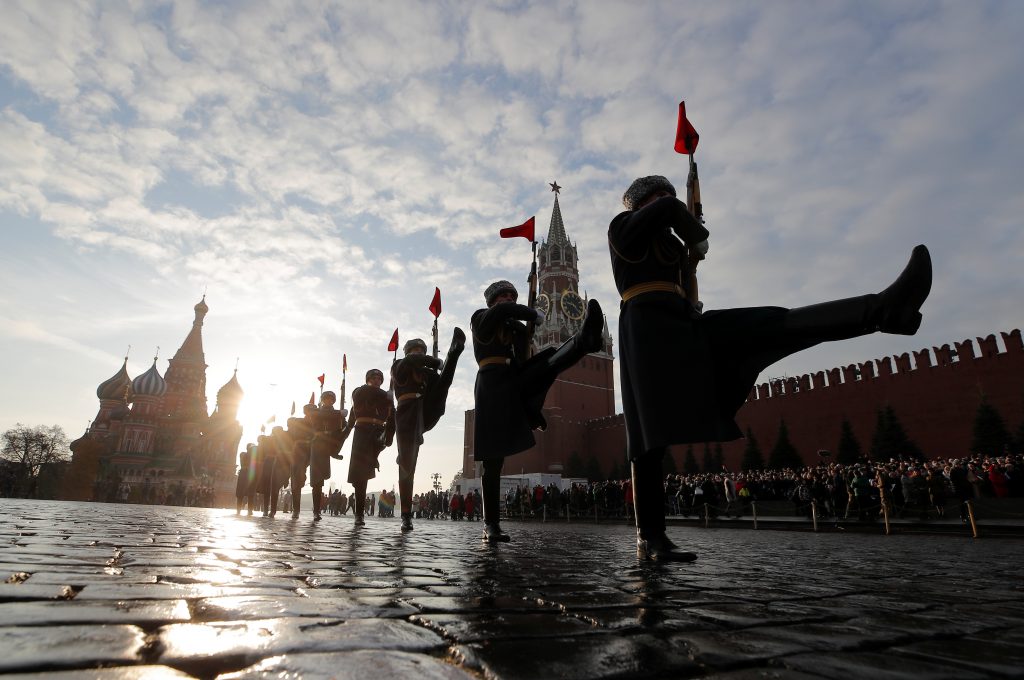Daniel Fried, John E. Herbst, Alexander Vershbow

War drums are beating in Europe. For the second time this year, Moscow is assembling up to 100,000 troops and military hardware on its border with Ukraine. The Biden administration judges that there is a real possibility that Russian President Vladimir Putin may decide to launch a new invasion of Ukraine in the next 2-3 months despite the high costs Moscow would incur.
Alarmed at the prospect of a potential Russian escalation, Washington dispatched CIA Director Bill Burns to warn of the severe consequences of such a step. When that mission produced no notable results, Washington made its concerns public. Secretary of State Antony Blinken took advantage of a press conference with visiting Ukrainian Foreign Minister Kuleba to scold Moscow for its military build-up, raise the possibility of a major new Russian offensive, and express strong support for Ukraine.
With Blinken in the lead, Washington has been consulting closely with allies. The results have been notable as NATO and then France and Germany jointly issued statements of support for Ukraine in the face of new aggression. Equally important, the United States has been asking its European allies and partners what they might do in terms of sanctions on Russia and military assistance to Ukraine if Moscow strikes again.
We are not predicting that Moscow will strike as this may be an elaborate bluff, but the Kremlin is putting itself in a position to strike and Putin’s rhetorical attacks on Ukraine and NATO have provided the justification the Kremlin would use for military action.
Putin may hope to scare the West, without the use of force, into scaling back its support for Ukraine, and to convince Ukrainian leaders that they must give up their dreams of Euro-Atlantic integration and accept Russian diktat. Indeed, he may hope Western leaders will persuade Kyiv to accept Russia’s terms in future negotiations, just as they persuaded Ukraine not to use its then weak military to fight Moscow’s seizure of Crimea in 2014.
Putin has upped the ante by drawing a new red line, in addition to his longstanding opposition to Ukrainian NATO membership. In recent weeks, Putin has declared that NATO’s military presence in Ukraine and allies’ arming and training of Ukrainian armed forces are tantamount to de facto military integration of Ukraine into the Alliance and therefore an unacceptable threat to Russia as well.
Moreover, beyond Putin’s purported security concerns, Ukraine is a highly emotional issue for him. His statements and pseudo-historical writings make clear that he resents Ukraine’s independence, questions its legitimacy as a sovereign state, disputes Ukrainians’ existence as a separate people, and is outraged by Kyiv’s refusal to accept Russian hegemony. He has made new territorial claims against Ukraine, arguing that Soviet leaders “robbed” Russia of its historic lands.
Putin may feel that, despite the high costs of an invasion, he has no choice but to go for broke, since further delay could guarantee that Russia loses Ukraine forever. This is not just a question of military security; Putin may fear that Ukrainian democracy, the rule of law, and resulting prosperity, if the Ukrainians can get there, would threaten Putinism in Russia through the power of example.
The best way to deter Moscow is to clearly lay out the cost of such a strike, while offering Putin a diplomatic way out. The Biden administration is off to a good start in communications to Moscow and cooperation with Europe. We offer here our thoughts on what concretely the United States, NATO, and the EU should do to dissuade Moscow from escalating and, ultimately, convince Putin to seek a reasonable political solution.
No comments:
Post a Comment